#((and her wanton cruelty in general; and will no doubt help take her down for good!))
Text
https://www.tumblr.com/beatingheart-bride/717384985381863424/theheadlessgroom-beatingheart-bride
@beatingheart-bride
Deciding to take a moment to give her a lesson himself, Randall explained, “Well, uh, if you do get cold, or you just want some fresh water, what you gotta do is pull the stopper down there...”
Rolling up his sleeve, he reached into the water to point out the stopper, before pulling out and gesturing back to the knobs, explaining, “And once the tub is empty, you can put it back and then refill it-this one, with the H on it? That stands for hot, and the one with the C here stands for cold.”
As he explained this to her, a curious question crossed his mind: What colors could Emily see? Could she see all the colors he could, or did sirens have a different way of seeing them? Was she colorblind? To be completely honest, he wasn’t even sure what kinds of colors fish could see, and he found himself briefly frowning in thought-maybe after dinner, he’d show her some of his color swatches and tell her what each one was.
“Randall! Soup’s on, come and get it!”
“Coming, Ma!” he called back, before smiling back to Emily, saying, “I’ll be back up after dinner!” before hustling out of the room, eager to get himself a big bowl of hot potato soup and spend a little time with his folks before he had to get back to work.
#((oh man; if constance so much as looks at the paces funny there's gonna be hell to pay!))#((constance has already done emily harm; beating her and leaving her for dead; and the pace family's kindness that saved her))#((and between that; the bond she's formed with all of them; and her love for randall; she won't let ANYTHING happen to them))#((so she'll be getting some serious payback when she returns to the bayou! and i feel the paces wouldn't let emily face her alone))#((and would do whatever they could to help emily: they've heard about her; they all know what she's done to emily))#((and her wanton cruelty in general; and will no doubt help take her down for good!))#((i think emily should be the one to deal the killing blow but i don't think the paces will sit idly by and watch the fight go down!))#outofhatboxes#beatingheart-bride#V:Part of Your World
7 notes
·
View notes
Text
Cruelty vs Compassion: Cullen and Niall in Broken Circle

Cullen: Uldred tortured these mages, hoping to break their wills and turn them into abominations. We don’t know how many of them have turned.
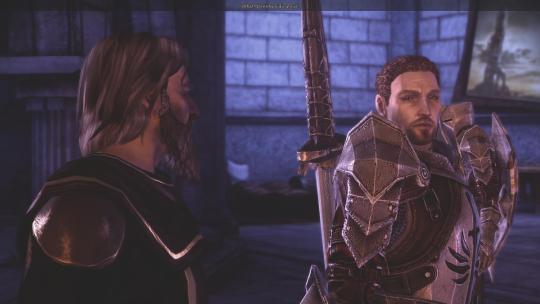
Irving: What? Don’t be ridiculous!
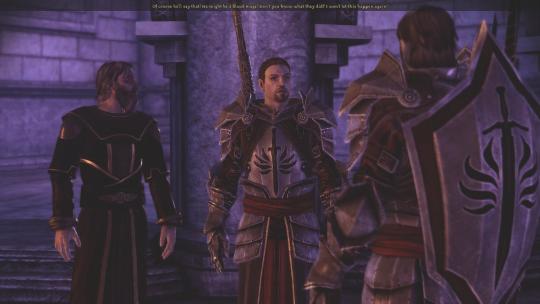
Cullen: Of course he’ll say that! He might be a blood mage! Don’t you know what they did?
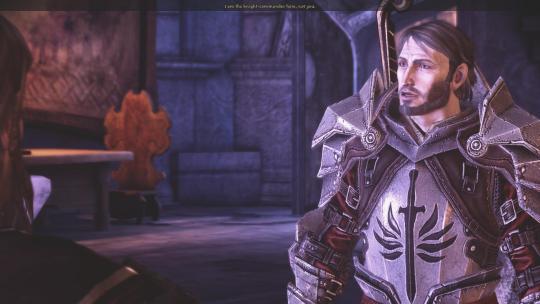
Greagoir: I am the knight-commander here, not you.
I know much is made of the torture Cullen suffered in the Fereldan Circle. In Dragon Age 2 it is used to set him up as an extremist, and an ally of Meredith. In Dragon Age Inquisition it is used to excuse and moderate his actions in the previous game, and to justify his ongoing persecution of mage characters.
However, I think it’s worth looking at that scene in the original context, in Broken Circle. Here, it isn’t really about Cullen’s pain at all. Rather, it is about establishing him, as well as his fellow templars, as the bad guys of the quest.
Bioware and its grey morality is ... a thing. When it works, it offers layers and complexity to the world and its story. When it doesn’t, it can leave the player frustrated and angry with a story that’s asking them to sympathise with vicious slavers, nobles and religious extremists.
Origins’s take on grey morality is to ... more or less literally let the player get away with murder, if they want. One way or another, you’re going to end the Blight, and then your Warden will either be a dead hero, or the living Hero of Ferelden, who can damn near do no wrong. While in Inquisition, and even DA2, it can be difficult to remain friends with a companion if you take a hard line stance on something they hate, in Origins they rarely have strong reactions to quest-based decisions. And hell, I have the Feast Day pack, so Seanna could disagree with her companions all day and then feed them cake until they loved her again, if she wanted. Origins is big on options; low on consequences.
It does, however, tend to give you a broad sense of which would be the ‘good’ or ‘evil’ options in a given quest. Murdering slaves to increase your stats is evil. Saving children from demons is good. Some quests have multiple options, and I don’t necessarily agree with the framing (the morality of The Urn of Sacred Ashes is pretty fucked up, if you ask me), but you can generally get a sense of whether your Warden’s behaviour counts as moral.
Cullen’s torture in Broken Circle, and his reaction to it, exists in counterpoint to someone else’s torture, and his reaction to it. Cullen is a foil to a much more important character: the man with the plan, and possibly the true saviour of the Fereldan Circle – the mage Niall.
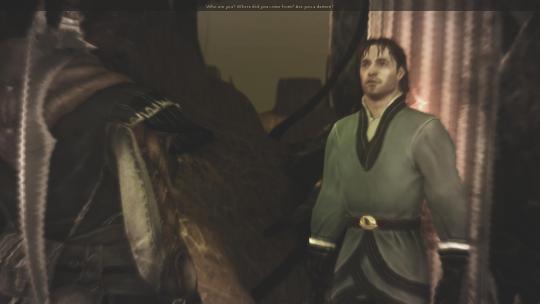
Niall: Who are you? Where did you come from? Are you a demon?

Cullen: This trick again? I know what you are. It won’t work. I will stay strong.

Niall: This place drains you of everything ... hope, feeling, life ...

Cullen: Enough visions. If anything in you is human ... kill me now and stop this game.
Unless you actively choose to go back downstairs after completing the Fade sequence (who hasn’t forgotten they still need to fight Shah Wyrd and made a last minute dash to the ground floor at least once?) you’ll likely have these encounters one after the other. Collecting the Litany of Adralla is the last step before you’re ready to take on Uldred.
It’s impossible to miss the parallels in these encounters: both men have been captured and tormented by demons; both are exhausted, despairing and at the end of their endurance; both have been confused enough by demons and Fade dreams to initially mistake the Warden for another spirit.

Niall: I gathered some of my fellows and we obtained the Litany from the stockroom. I thought if we disabled the others, we could throw everything we had at Uldred.
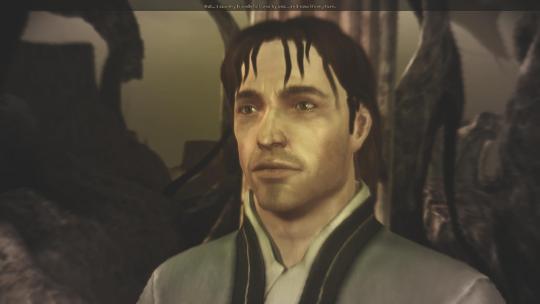
Niall: But I saw my friends fall, one by one, and now it’s my turn.
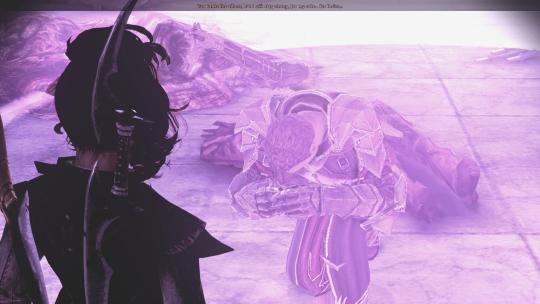
Cullen: You broke the others, but I will stay strong, for my sake ... for theirs ...
Both have lost the friends they came with, and have found themselves the last man standing against an enemy they have no hope of defeating. Both have, in short, had a really shit couple of days. They’re not equally bad, of course: Niall is being quite literally eaten alive by a sloth demon, and will not survive the day; while no doubt exhausted and distressed, Cullen is more-or-less fine. But let’s not quibble: they’re both in a bad way.
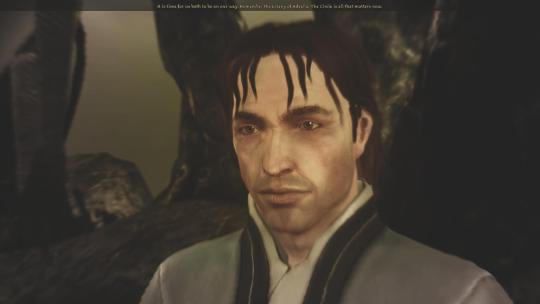
Niall: It is time for us both to be on our way. Remember the Litany of Adralla. The Circle is all that matters now.

Cullen: To ensure this horror is ended ... to guarantee that no abominations or blood mages live, you must kill everyone up there.
And, significantly, both characters advise you on how to complete the quest: Niall wants you to save anybody who’s still breathing; Cullen wants you to murder everyone. Niall’s plea, while impassioned, is also reasoned and well thought out – he came in with a plan, a good plan, and he only needs your help to complete it. He is profoundly dignified, even at the point of death, after days of wandering through the same hellscape you just golem-and-fiery-skeleton-ed your way though. He judges himself for failing to win a battle he should never have had to fight. Meanwhile, Cullen is aggressive and demanding. He rejects any offer of compassion – especially from Circle mage Wynne, despite the fact that she has come to save him – and he doesn’t really have a good argument as to why you need to kill everyone. It boils down to ‘kill them just in case’.
You don’t need to put a halo and a pair of horns on these two to guess who is sitting on which shoulder.
It’s worth noting, at this point, that the choice between Niall’s way and Cullen’s sits against the background of information you’ve gathered as you ascend the tower. Mage wardens will obviously have a little more context for the places and characters you meet, but you don’t need that. The story establishes it on its own: templars are full of shit; mages are pretty awesome.
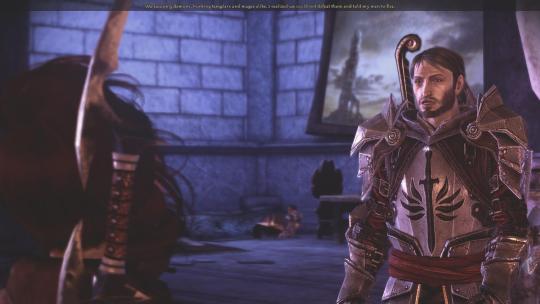
Greagoir: We saw only demons, hunting templars and mages alike. I realised we could not defeat them and told my men to flee.

Greagoir: They took us by surprise. We were prepared for one or two abominations – not the horde that fell upon us.

Greagoir: No one could have survived those monstrous creatures. It is too painful to hope for survivors and find ... nothing.
When you first enter the Circle you encounter Knight-Commander Greagoir, who makes it abundantly clear that, though the templars are technically trained in dealing specifically with demons and blood magic, they were in no way prepared for any situation involving demons, plural. They cut and run immediately, leaving behind both the entire mage population and their own templar brethren. Greagoir is firmly of the opinion that the situation in the Fereldan Circle is not survivable. Everyone in there who is not a demon is dead.
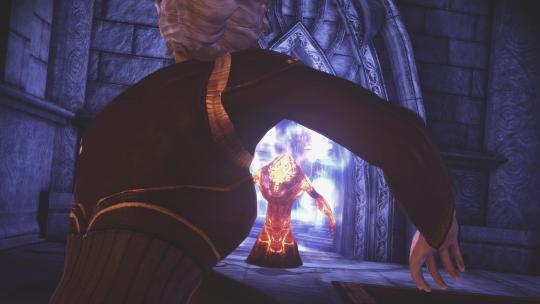

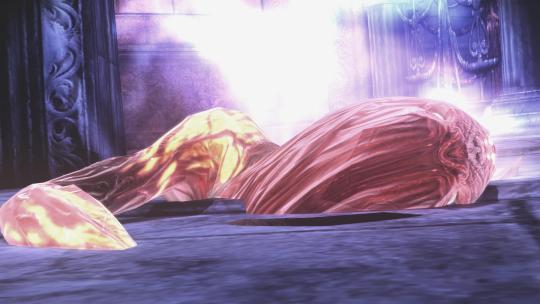
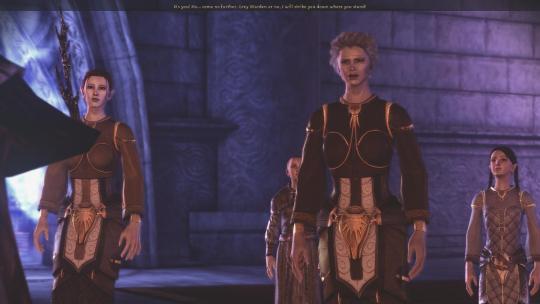
Wynne: It’s you! No ... come no further. Grey Warden or no, I will strike you down where you stand!
As soon as you step through the doors, you find that he is thoroughly and disastrously wrong. You encounter an entire section that has been successfully cleared and secured. You watch a mage defeat a demon – entirely without your aid. You see that, not only are there survivors, some of the survivors are children.

Greagoir: This situation is dire. There is no alternative – everything in the tower must be destroyed so it can be made safe again.
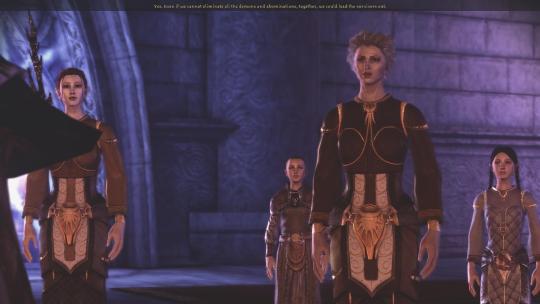
Wynne: Yes. Even if we cannot eliminate all the demons and abominations, together, we could lead the survivors out.
Greagoir’s plan is simply to murder everyone: to charge in and stick a sword in anything that moves (children included) without any thought of strategy or reason. Wynne would like to be methodical: she would like to go from room to room, killing any hostiles she encounters, and send survivors down to safety.
We already have evidence that Greagoir's assessment of the situation is wildly inaccurate – the mages in front of us. Likewise, we have evidence that Wynne and her people can follow through on the plan: they’ve already cleared this area, and protected the children.
Wynne pairs with Greagoir and Niall pairs with Cullen. The debate you hear at the bottom of the tower is repeated at the top. In both instances, the mages present solid plans to save as many people as possible; in both instances, the templars advocate wanton destruction for no clear reason.
The templars’ argument is further undermined by evidence you find as you climb the tower:
Pile of Rubble in first area after ascending to this level: I have the utmost sympathy for what happened to your charge, but it is beyond the Cicle's ability to anticipate every obscure demise that an apprentice might face, especially involving methods outside the already extensive realm of magical study. We simply don't have the room for additional training facilities, and there are concerns about becoming too inclusive that I will not elaborate on. Your request is denied.
--First Enchanter Sinclair
Pile of Books in next room after escaping from the Fade: If space is your excuse, I will surrender my quarters. If it is about money, I will hire the appropriate people. I will not graduate another student ignorant of weapons that any ditch-digger can shove into his ribs. We teach them to append ridiculous glamours on parade arms, but they don't know simple steel. That is criminal.
--Enchanter Bergin
Pile of Books in room with Blood Mage and Charmed Templars: Notice herewith that the exercise area on the fourth floor shall serve as permanent berthing for the templar garrison stationed at the tower. Since facilities that accommodate their particular training requirements are already on hand, they will be assuming an even closer watch over Circle affairs. Enchanter Bergin's optional weapons training is canceled until further notice. Enchanter Bergin has additionally stepped down from teaching duties.
--First Enchanter Sinclair
– Extracurricular Studies
It’s established that the mages have been actively prevented from learning how to defend themselves. There used to be combat classes, taught by someone named Enchanter Bergin, but he was forced to stop and templars moved in to his space to “assum(e) an even closer watch over Circle affairs”.
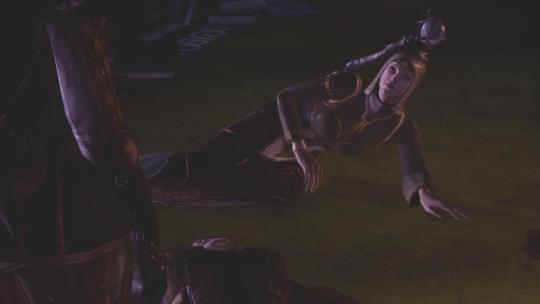
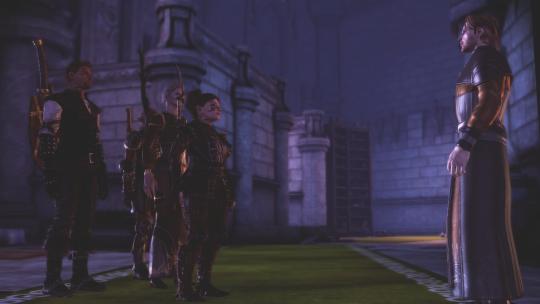
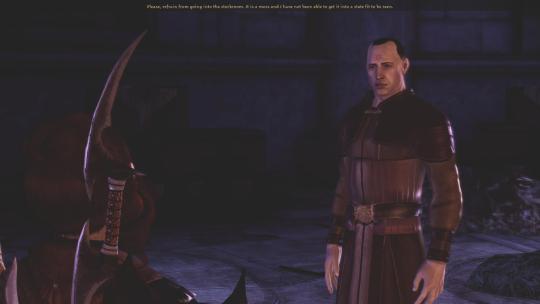
Owain: Please refrain from going into the stockroom. It is a mess and I have not been able to get it into a state fit to be seen.

Tranquil: Thank you. That was an uncomfortable experience.

Nevertheless, there are several encounters with mages and tranquil in this quest who are fighting, hiding, resisting torture – still trying to find a way through this nightmare. There are survivors. Despite what the templars tell you, there are people you can save.
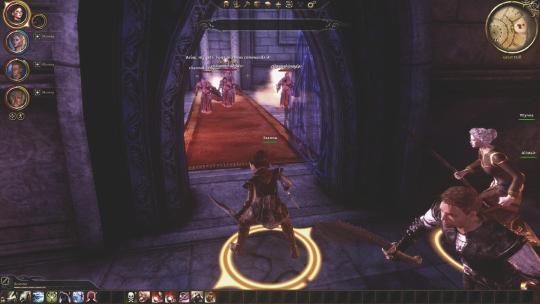
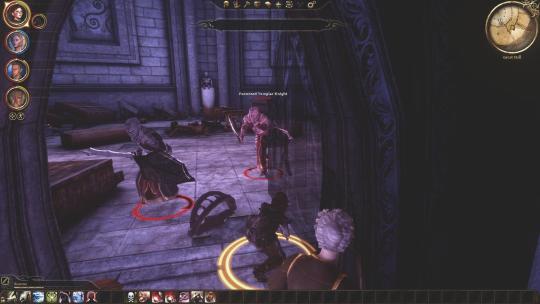
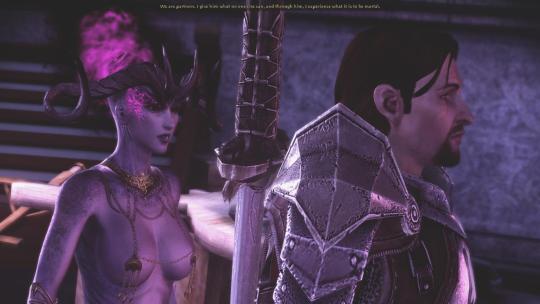
Desire demon: We are partners. I give him what no one else can, and through him, I experience what it is to be mortal.
Meanwhile, Cullen outright admits that the rest of his comrades broke (we have only his word that he didn’t, which strangely enough he expects us to accept, while not regarding Irving’s word as good enough), and there are no free templars in the entire quest. They are all possessed or charmed by demons.
Broken Circle is asking you a simple question. Which do you want? Warriors trained in dealing with the arcane and the monstrous who will absolutely scream and run away if the fight gets a little bit difficult? Or civilians with no combat training who have proved to be surprisingly resilient in a crisis?
Strategically, that might be a bit tough: what you actually want is competent professionals, and those are in short supply right now. Morally, it’s an easy call: the mages are heroes, survivors and innocents; the templars are murderous cowards.

Alistair: His hatred of mages is so intense ... the memory of his friends’ deaths is still fresh in his mind.
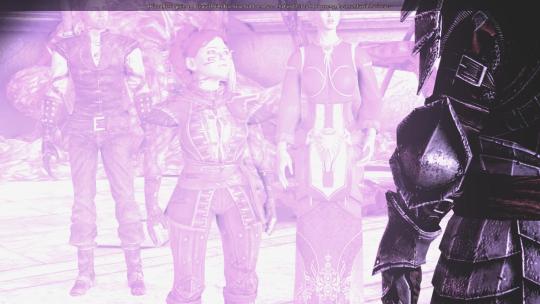
Wynne: He’s suffered pain and anguish like few have had to endure. That and his lust for revenge have confused the issue –

Cullen: Do not presume to judge me, mage! I am thinking clearly – for perhaps the first time in my life.
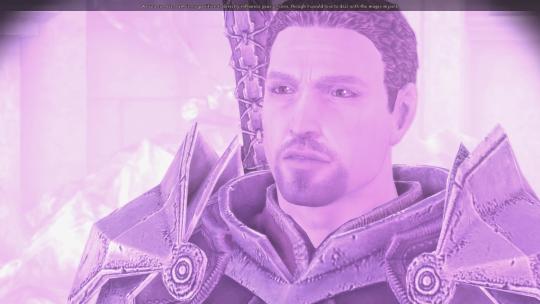
Cullen: As you can see, I am in no position to directly influence your actions, though I would love to deal with the mages myself.
To return to Cullen’s motivation – while no one is disputing that he’s had a really bad day (We’re not! We’re all being very understanding about his demands for mass murder!), the story doesn’t actually emphasise his distress very much. That is raised and dismissed. What is raised and accepted is that Cullen is angry. Cullen is vengeful. The mages (some of them, anyway) have risen up, and templar blood has been spilled. Now mage blood must be spilled in return. It doesn’t matter very much if the mages were involved in the uprising or not. He just wants to kill them in an act of revenge.
While we can understand Cullen’s grief over his friends at a personal level, it’s worth considering whether it’s reasonable. We have just established that the mages are imprisoned in the Circle tower, that they have been prevented from learning how to protect themselves, and that the templars have not only abandoned their charges to die, they are actively in favour of murdering them.
Do ... we care that much about their deaths? This looks like the only part of the uprising that went right.
This is like Nathaniel Howe’s distress over his father’s death. Of course you can sympathise: this was his dad. But at the same time, you expect him to look at the evidence, and come to understand that his father was not an innocent. Nathaniel does, because he is a fundamentally decent person. Cullen doesn’t.
Put another way: if you’ve played Fallout 4, you’ll note that the NPC raiders sometimes cry out in grief and distress when their comrades fall in battle. That’s a nice touch on the AI: the raiders are human beings, with human emotions, and the people you’re killing are their friends, their family. But when the battle is done and you walk into their camps ... and you observe the bloody remains of their victims scattered about for decoration ... maybe you don’t feel too bad about making them sad?
Same deal.
The original epilogue for this quest has this:
Templars
Once the tower was rebuilt, Knight-Commander Greagoir stepped down from his post and retired to a life of private contemplation as a brother in the Chantry. His health failed over time, and after refusing treatment, he perished in his sleep. Knight-Commander Cullen was said to be more strict and less trusting of the mages even than Greagoir was. He ruled the Circle with fear.
Mages
The young templar Cullen never quite recovered from his ordeal. After months of attempting to convince his superiors that the tower was still a danger, he finally snapped and killed three apprentices before being stopped by his fellow templars. Eventually, Cullen escaped from prison, a madman and a threat to any mage he encountered.
– Epilogue
Now, I realise the details of this have been pretty thoroughly retconned. There is absolutely no point in bringing this stuff up in relation to later games. However, it is worth looking at the epilogue in relation to the original quest. Regardless of the ending you choose, these epilogues tell you that the real threat was never the mages, or even the demons. The threat was the templars – the individual murderer, or the institution with a cruel man in charge.
The mages are not possessed (at least not in a harmful sense – Hi, Wynne!). They are not evil. But the templars always have power over them, and they can hurt them simply because they hate them. Cullen hates them, and was thwarted in his vengeance. So he hurts them.
Also, if you mash those two endings together and change the location you’ve pretty much got the plot of Dragon Age 2. So the details have changed, but the theme remains the same.
To end: Broken Circle fundamentally lets you choose. You can show compassion to the tortured mages, who asked for none of this, and who were never prepared for this violence. You can accept the aid of their heroes, enact a plan, and save the survivors. Or, you can murder them to satisfy the vengeance of their gaolers who resent having to take any risks on behalf of their charges.
Niall represents that compassion. Cullen represents that cruelty. It isn’t really about Cullen’s tragedy at all. If anything, it’s about Niall’s. And yet, two games on, he is effectively forgotten.
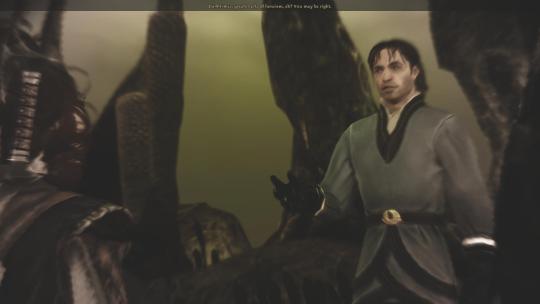
Niall: Dark times, greater acts of heroism, eh? You may be right.
A salute to Niall – who fought for compassion and saved the Circle (at least from my save game) when the templars would have destroyed it.
2K notes
·
View notes
Text
Authorities rioted this weekend, validating the entire point of the demonstrations
In cities across America this weekend, lots of cops devoted acts of violence, callously violated people’ rights, and abandoned the guideline of law.
There’s an institutional rot at the heart of policing in this country, which stems from benefits paid for to police officers that permit them to break the law, abuse their authority, and hurt innocent people.
The Supreme Court has the chance to squash “certified immunity” for law enforcement officer, however even that wouldn’t suffice.
Police unions almost widely resist any steps at openness and responsibility, and it is far too easy for bad police officers to either remain on the job or find new law enforcement tasks after they have actually been fired.
Democrats need to overcome thir reflexive pro-union posture and Republicans ought to drop their knee-jerk fealty to armed authority– and safeguard the civil liberties of Americans.
This is a viewpoint column. The thoughts revealed are those of the author.
Go to Company Insider’s homepage for more stories
In cities across America over the past several days, lots of cops rioted.
Wanton acts of violence were devoted. Rights were callously breached. The guideline of law was deserted.
To be sure, there were plenty of excellent and worthy acts by cops this weekend. Some police chiefs marched peacefully with protesters, others made it a point to directly take part in discussion with their neighborhood. Numerous officers secured innocent individuals, their residential or commercial property, and likewise did their finest to make sure as safe an environment as possible for peaceful protesters.
No police officers should have to be attacked with projectiles. This should not be questionable.
The violence and home damage connected with the ongoing civil unrest is untenable, the robbery is indefensible. Both do amazing damage to any cause seeking justice, specifically ones combating to end police cruelty and reform the criminal justice system.
None of that makes examining the occasions of the previous couple of days, the underlying causes, and the motivations of the individuals any easier. Far from a binary excellent versus bad decision, there are myriad concerns to unpack. Any discussion focused only on the riots and looting, but which does not deal with law enforcement’s fondness for excessive force and institutional resistance to accountability is both disingenuous and unserious.
For the minute, I’m going to concentrate on the institutional rot at the heart of policing in this nation, which the opportunities afforded to police officers allow them to break the law, abuse their authority, and harm innocent people.
It’s these benefits which are codified into cops union contracts with governments, and supported by the conservative analysis of a 1871 law called Section 1983, which they believe supplies “qualified immunity” to law enforcement officers from dealing with liability in civil courts for violating citizens’ civil liberties.
Police rioted
In Minneapolis— the city where the nationwide discontent was sparked by the killing of George Floyd, an unarmed black man who passed away on May 25 after Derek Chauvin, a white authorities officer, knelt on his neck for over 8 excruciating minutes– members of the cops and national guard marched through a peaceful neighborhood as if it were Fallujah in 2004.
The militarized police barked orders at citizens, commanding them to go back into their houses.
They were on their front patio.
Another Minneapolis officer carried out a drive-by pepper-spraying of tranquil protesters and media in broad daylight.
As violence erupted in at least two lots United States cities, some of the worst instincts of police were on screen.
In Louisville, authorities seized and damaged a considerable amount of bottled water being used for the relief of peaceful protesters.
In Salt Lake City, an armored law enforcement officer who had no crowd to distribute still felt compelled to stroll straight towards a senior man with a walking stick and shove him to the ground
In New york city, two NYPD automobiles raked through a barricade and into a crowd of protesters. A young man with his hands in the air had his mask took down by an NYPD officer, who then pepper-sprayed him at point blank variety. And a minimum of throughout one effort at crowd clearance, officers manhandled and attacked anyone in their way
In Charleston, a young man amongst a group of kneeling protesters offered a tearful speech at the armored polices opposite them. After pleading with their humankind, even informing them the cops he liked them, a group of officers charged toward the protesters and pulled the speaker into custody. He was arrested while quietly opposing and exercising his flexibility speech
Authorities can typically face mortal risk and severe stress in their type of work. With the government-sanctioned power to deny residents of both life and liberty, they are required to swear an oath that they will be responsible, truthful, and lawful in the use of such power.
Law enforcement officer, by and large, attempt to maintain that oath. Police unions and many authorities departments do whatever in their power to make that oath just empty words by fighting any genuine efforts at transparency and responsibility when it pertains to the use-of-force.
This has needed to change for decades. Now could be the moment it must.
The Supreme Court ought to squash “qualified immunity” at last
George Floyd’s death won’t fail if it results in the Supreme Court finally eliminating the “certified resistance” analysis of Area 1983 of the US Code– which essentially provides an armored guard for officers to avoid being held responsible in civil courts for breaching citizens’ civil liberties.
Clark Neily, the vice president of criminal justice at the libertarian-leaning Cato Institute composed in The Bulwark that the general conservative interpretation Area 1983 is a rare– and I ‘d say cynically hypocritical– instance of the best deserting its “originalist” technique to the Constitution.
As Neily puts it, victims of cops violence have little recourse in the court system “unless they can discover a pre-existing case in the jurisdiction with almost similar facts” to their own event. That puts the onus on the victim to show that their rights were in fact breached, because a standard interpretation of the Constitution will not do.
Floyd’s family would essentially have to find a case where a police killed someone by kneeling on their neck for an obscene length of time to get Chuavin’s qualified immunity waived.
Originalists have to twist themselves into pretzels to analyze the statute’s language so that it gives law enforcement the special advantage of the doubt in nearly every circumstances.
But that’s not the only systemic concern preventing any significant reforms of cops accountability.
Cops unions all over the country have worked out into their contracts all sort of unsuitable and unfair protections from facing justice for their actions.
The Black Lives Matter-associated group Campaign No created an extremely important database of police union agreements that shows “72 of the 81 cities’ contracts imposed at least one barrier to holding authorities liable.”
A few of these include a grace period of approximately numerous days after a fatal police-involved shooting prior to an officer can be spoken with. Others essentially keep disciplinary records from public view permanently.
The militarization of authorities– fueled by the Department of Defense’s “ area 1033” program which hands over surplus military devices to regional police departments– was reduced near completion of the second Obama administration however restarted in force by the Trump administration.
And then there’s the reality that in this country, it is disturbingly easy for a law enforcement officer fired for abuse, corruption or other causes to discover another job in law enforcement In some states, it’s more difficult to get a license to braid hair than it is to be licensed as an armed representative of the state
Thanks to a confluence of public sector union power, a federalist system of government, and the hesitation of many regional and state governments to keep and share databases including the names of bad polices who have been fired for cause, bad polices keep working.
Policing isn’t a basketball video game
According to Teresa Nelson, the ACLU of Minnesota’s legal director, the Minneapolis PD’s union manager Lt. Bob Kroll informed her in 2015 that he saw problems versus officers as comparable to fouls in basketball.
” If you’re not getting any fouls, you’re not striving enough,” Nelson says Kroll informed her, as reported in The New York Times
Chauvin had at least 18 problems. That’s enough to foul out of 3 NBA games.
Kroll, according to public records, has actually had at least 29 problems made versus him.
Lest it required to be said, policing is not a game and allegations of abuse are not basketball fouls. Policing, when done improperly, destroys life and liberty.
Throw in all the occurrences of heavy-handed to outright criminal behavior by law enforcement throughout this dreadful weekend in American history and it’s clear that modification is needed.
When the dust settles, we don’t need a “law and order” bootheel to make things much better, we require the political will to require that the law enforcement community reform itself away from its inhabiting army posture and make its disciplinary records transparent to the public.
Find Out More:
Don’t make social media tech bro billionaires the arbiters of truth
The allegation versus Joe Biden has Democrats discovering the worth of due procedure
Forget Twitter, the Trump project’s pointless lawsuits are next-level threats to the First Change
Coronavirus hero Cuomo helped develop New york city’s disaster
%%.
from Job Search Tips https://jobsearchtips.net/authorities-rioted-this-weekend-validating-the-entire-point-of-the-demonstrations/
0 notes